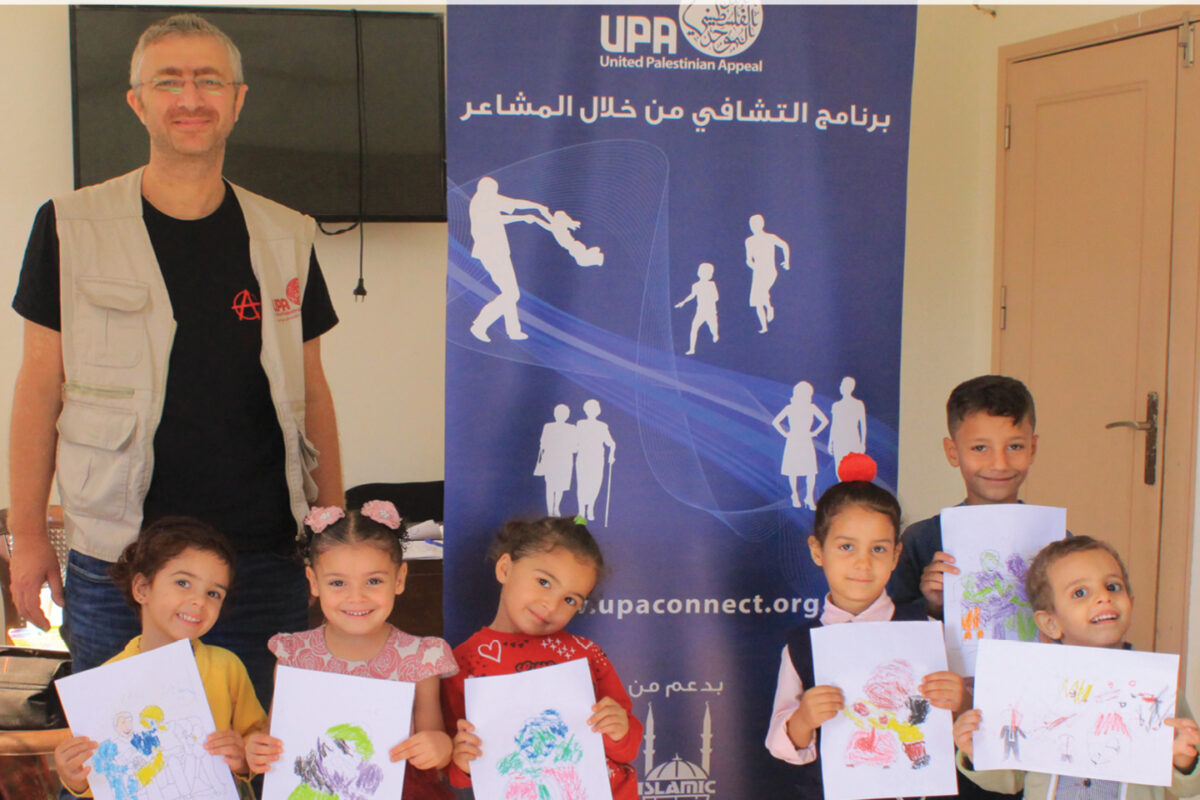Meet one of UPA’s mental health practitioners!
Khader Alrayyes is a seasoned mental health practitioner who, over the past five years, has served as a clinician and program coordinator for Healing Through Feeling. We sat down with Khader for an inside perspective on mental health in Gaza.
What are the biggest challenges you face treating mental health in Gaza?
The biggest challenge is continuous trauma. We work with patients to address trauma symptoms and then another traumatic event happens again. Often, I feel like Sisyphus in the Greek myth, pushing the stone up the mountain. It rolls right back down, so, you just push it back up again. Based on the complicated context in Gaza, our goal as mental health practitioners is to improve people’s resilience and ability to stand up again. Our beneficiaries ask only for a normal life. They want to raise their children, see them grow up, and seek a better future for them. This is what we help them do.
What motivates you to come to work every day despite the challenges?
The ability to help people. I can see with my own eyes the effect this work has on people’s reality. Patients give us feedback and tell us how we have changed their lives. This feedback recharges my motivation day after day. For me personally, this helps to overcome feelings of helplessness because when you help other people, you feel that you are not helpless. You can make change even if it’s small, and this improves my mental health. We have two choices, either to be victims or to work to improve our lives and our children’s lives. I think we choose the latter.
How do you support other UPA mental health practitioners to grow their skills and avoid burnout?
The continuous wars, attacks, and 17 years of siege in Gaza have psychological, social, and economic implications. As mental health practitioners, we need to help people during that time, and we also need to help ourselves because we also have families, and we have feelings. Mental health practitioners are also humans. As part of the Healing Through Feeling program, we have clinical supervisors who give us individual and group supervision sessions. During these sessions, we can address our own emotions and personal challenges and discuss the best way to deal with them. The program also provides training so mental health staff can continue to acquire knowledge and skills.
What high-level community change have you seen in terms of mental health awareness?
From my perspective, I have seen a lot of changes during my experience with Healing Through Feeling. At first, very few people knew about this program. Now we work with a lot of kindergartens and caregivers. Even the ones who we worked with three years ago give us positive feedback when we see them again. They tell us that they still remember the stress management techniques or steps for trauma alleviation that we taught. From the numbers perspective, our evaluations show significant improvements before and after the interventions. Now, a lot of kindergarten administrators contact us and ask to join the psycho education sessions that we provide, and previous participants come back to ask about an issue with their child or ask for another consultation. I think there is a good effect on the community overall because of this.
What do you want the world to know about mental health in Gaza?
The reality is that trauma here is not just about the war and blockade, it runs much deeper. If a family is targeted by war, for example, they can start to experience other effects. They may become sensitive or aggressive, and maybe conflicts start to arise between the husband, wife, and children. It’s not just about the bombing itself, it’s the consequences that continue for years. We need to keep helping people.
I want to thank everyone for their support of Healing Through Feeling because, without their support, it’s hard to do all of this work. I hope that they will continue to support our people because, despite the suffering and pain, we believe that we are equally human. Palestinians deserve to live in humane circumstances like people all over the world. Our children deserve a different future. They should be able to live in a safe environment that can help them to grow up and live the life they deserve.
Palestine needs more clinicians like Khader
The life-changing impact of UPA’s Healing Through Feeling program would not be possible without the hard work of our mental health personnel. Unfortunately, mental health services in Palestine are deeply constrained by professional shortages. To build capacity, UPA has hired a clinical psychiatrist to train psychiatry residents in the West Bank and we are now working to secure additional residency placements for more Palestinian trainees. Your support can help us add additional residency seats, build important mental health services, and strengthen other life-changing programs like this!

